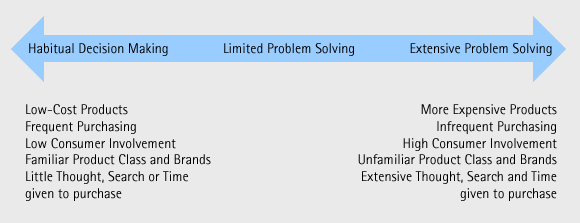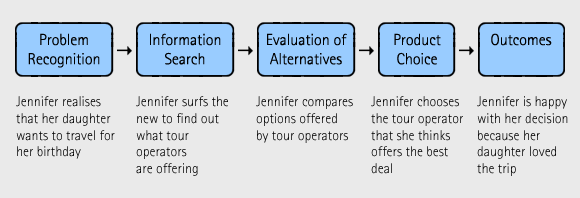| Types of consumer decision making
Consumers engage in decision-making processes when they identify
that there is a gap between their desired state and their actual
state. If there is a significant difference between the desired
and actual state, a problem is identified and an information search
is initiated. Understanding how consumers make decisions is relevant
to marketing practitioners because it demonstrates why satisfying
and surpassing consumers' expectations is the key to repeat purchases.
Depending on the nature of the product or service and the consumers'
level of involvement with the product or service, consumers will
make different types of decisions. If a consumer is about to commit
a substantial amount of money to travel on the Orient
Express and this is the first time such a decision is made,
then he will engage in extensive problem solving in order to ensure
that his choice is a sensible one. This is illustrated in Figure
8.3.
| Figure 8.3 Consumer problem solving |
|

|
In summery then, there are a number of different stages to decision
making that can be identified. Again, using the Jennifer example,
these are illustrated by Figure 8.4.
| Figure 8.4 Stages in consumer
decision-making |
|
 |
Consumer behaviour: a critique
Human behaviour is very complex and consumer behaviour theories
tend to look at the consumers in isolation without taking into
consideration all the mediating factors leading to and resulting
from a purchase. In addition, most consumer behaviour models assume
that humans are rational at all times, however human behaviour
is also driven by emotional triggers that have only just begun
to be taken into consideration. More importantly, the emphasis
so far has been placed on controlling consumer behaviour, rather
than on understanding it.
However, marketers are now acknowledging that consumer behaviour
is an ongoing process that goes beyond the actual purchase of
a product or service. In that regard, consumer behaviour is not
only interested in assessing what makes consumers 'buy', but also
delving into the meanings consumers award to goods and services.
From that point of view, marketers can gain rich insight of how
consumers feel towards brands, what products and services mean
to them or how they are being used. Read the different product
usage stories on this website and see if you can
relate to any of them.
|

